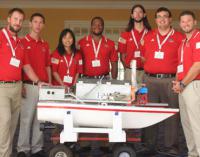-
Warmings greater than 1.5 °C inevitable owing to current atmospheric greenhouse concentrations
Current levels of atmospheric greenhouse gas concentrations already commit the planet to air temperatures over many land regions being eventually warmed by greater than 1.5°C, according to new research. The results of the new study have implications for international discussions of what constitutes safe global temperature thresholds, such as 1.5°C or 2°C of warming since pre-industrial times. The expected extra warming over land will influence how we need to design some cities. It could also impact on the responses of trees and plants, including crops.
-
-
Climate disasters increase risk of armed conflict in multi-ethnic countries
Climate disasters like heat-waves or droughts enhance the risk of armed conflicts in countries with high ethnic diversity, scientists found. Each conflict is certainly the result of a complex and specific mix of factors, but it turns out that the outbreak of violence in ethnically fractionalized countries is often linked to natural disasters that may fuel smoldering social tensions.
-
-
Three ways synthetic biology could annihilate Zika and other mosquito-borne diseases
There are tried and tested approaches in the arsenal of weapons against the mosquito-borne disease, but to combat Zika and other mosquito-borne disease, more is needed. Gene drives, synthetic biology-based genetic engineering techniques, offer one solution by reengineering mosquitoes or obliterating them altogether. Yet we still have only the vaguest ideas of how the systems we’re hacking by using gene drives actually work. It’s as if we’ve been given free rein to play with life’s operating system code, but unlike computers, we don’t have the luxury of rebooting when things go wrong. As enthusiasm grows over the use of synthetic biology to combat diseases like Zika, greater efforts are needed to understand what could go wrong, who and what might potentially be affected, and how errors will be corrected.
-
-
Gene-drive modified organisms not yet ready to be released into environment: Scientists
The emerging science of gene drives has the potential to address environmental and public health challenges, but gene-drive modified organisms are not ready to be released into the environment and require more research in laboratories and highly controlled field trials, says a new report from the National Academies of Sciences.
-
-
Do think-tanks matter? Expert says “think again”

A recently published study found that public sector workers judged studies and reports generated by scholars affiliated with universities to be more credible than reports or studies purported to be from a think-tank or advocacy group.
-
-
New UAlbany undergrad major in emergency preparedness, homeland security, cybersecurity
The University of Albany’s College of Emergency Preparedness, Homeland Security and Cybersecurity has received approval from the New York State Education Department to establish the bachelor’s degree program in emergency preparedness, homeland security, and cybersecurity at the start of the 2016-2017 academic year. The college is the first stand-alone academic institution in the United States dedicated to emergency preparedness, homeland security, and cybersecurity.
-
-
New research predicts a doubling of coastal erosion by mid-century in Hawai’i
Chronic erosion dominates the sandy beaches of Hawai’i, causing beach loss as it damages homes, infrastructure, and critical habitat. Researchers have long understood that global sea level rise will affect the rate of coastal erosion. Newresearch team developed a simple model to assess future erosion hazards under higher sea levels.
-
-
Cape Cod susceptible to potential effects of sea-level rise
Cape Cod is vulnerable to rising water tables and, in some areas, groundwater inundation as a result of rising sea levels, according to a new U.S. Geological Survey study (USGS). Groundwater inundation occurs when the water table reaches or exceeds land surface. The challenges associated with the issue are likely to become more prevalent as seas rise. Depending on the severity, it may make areas unsuitable for residential and commercial development.
-
-
Penn State adds new homeland security offerings

Penn State is expanding its portfolio in homeland security with a new graduate-level certificate that focuses on how to ensure that hospitals and medical care facilities stay functional during emergencies and disasters. In the coursework for the 15-credit certificate, students will learn the ways to prepare hospitals for and respond to emergencies, such as mass-casualty events, floods, earthquakes, disease outbreaks, or terrorist attacks.
-
-
Enrollment in U.S. science and engineering graduate school increases

After remaining essentially flat for the past two years, the number of full-time graduate students enrolled in science and engineering (S&E) programs rose by 2.4 percent in 2013, to nearly 425,000 students. The increase was largely due to a 7.9 percent rise in full-time enrollment of foreign graduate students on temporary visas. Foreign enrollment hit an all-time high of 168,297 students in 2013, or 39.6 percent of the full-time S&E graduate student population—up from 35.9 percent in 2008.
-
-
Managing the endangered Rio Grande River across the U.S.-Mexico border

The Rio Grande (called Rio Bravo in Mexico) is the lifeline to an expansive desert in the southwest United States and northern Mexico. From Colorado to the Gulf of Mexico, over 3,000 km, people depend on the river to quench their thirst and irrigate their crops. Yet as the river flows from the United States, it brings with it conflicts and challenges. The water level in the river is declining as use exceeds supply. Water demand is rising as the population in the region grows, and corresponding economic growth drives continued development. Moreover, climate change is expected to lower water levels even further, exacerbating the problems.
-
-
Breaking records: The first six months of 2016 the warmest half-year on record
Two key climate change indicators — global surface temperatures and Arctic sea ice extent — have broken numerous records through the first half of 2016. While these two key climate indicators have broken records in 2016, NASA scientists said it is more significant that global temperature and Arctic sea ice are continuing their decades-long trends of change. Both trends are ultimately driven by rising concentrations of heat-trapping carbon dioxide and other greenhouse gases in the atmosphere.
-
-
3D printing: a new threat to gun control and security policy?
The threat of self-manufactured firearms is not new, but a critical barrier is collapsing. Until recently, most people did not have the skills to make a weapon as capable as commercially available ones. However, recent developments in the field of additive manufacturing, also known as 3D printing, have made home manufacturing simpler than ever before. The prospect of more stringent gun safety legislation is also fueling interest in at-home production. The worst threats 3D printing poses to human life and safety are likely some distance in the future. However, the harder policymakers and others work to restrict access to handguns or unconventional weapons, the more attractive 3D printing becomes to those who want to do harm.
-
-
DHS report highlights R&D priorities for technologies used in the field

The Department of Homeland Security has released the Integrated Product Teams for Department of Homeland Security R&D Fiscal Year 2016 Report. The report identifies twenty-four focus areas for technological research and development (R&D), which fall under five mission areas: aviation security, biological threats, border security, cybersecurity, and counterterrorism.
-
-
The future of naval force and RoboBoats

The future of naval engineering was on display earlier this month, as thirteen teams of high school and college students did battle at the ninth annual RoboBoat Competition in Virginia Beach, Virginia. The competition is a robotics contest where teams program their student-built autonomous surface vehicles to navigate through a series of water-based challenges.
-
More headlines
The long view
New Technology is Keeping the Skies Safe
DHS S&T Baggage, Cargo, and People Screening (BCP) Program develops state-of-the-art screening solutions to help secure airspace, communities, and borders
Factories First: Winning the Drone War Before It Starts
Wars are won by factories before they are won on the battlefield,Martin C. Feldmann writes, noting that the United States lacks the manufacturing depth for the coming drone age. Rectifying this situation “will take far more than procurement tweaks,” Feldmann writes. “It demands a national-level, wartime-scale industrial mobilization.”
How Artificial General Intelligence Could Affect the Rise and Fall of Nations
Visions for potential AGI futures: A new report from RAND aims to stimulate thinking among policymakers about possible impacts of the development of artificial general intelligence (AGI) on geopolitics and the world order.
Smaller Nuclear Reactors Spark Renewed Interest in a Once-Shunned Energy Source
In the past two years, half the states have taken action to promote nuclear power, from creating nuclear task forces to integrating nuclear into long-term energy plans.
Keeping the Lights on with Nuclear Waste: Radiochemistry Transforms Nuclear Waste into Strategic Materials
How UNLV radiochemistry is pioneering the future of energy in the Southwest by salvaging strategic materials from nuclear dumps –and making it safe.
Model Predicts Long-Term Effects of Nuclear Waste on Underground Disposal Systems
The simulations matched results from an underground lab experiment in Switzerland, suggesting modeling could be used to validate the safety of nuclear disposal sites.
